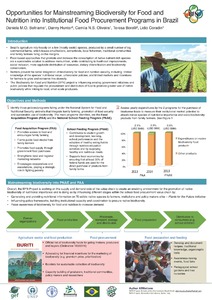Opportunities for mainstreaming biodiversity for food and nutrition into institutional food procurement programs in Brazil
Abstract
Brazil has a well-established political and regulatory framework aimed at promoting food and nutritional security. This framework represents an innovative and ethical social contract aimed at achieving social inclusion, sustainable livelihoods and citizenship. It includes the Food Acquisition Program (PAA) and the National School Meals Program (PNAE), institutional food procurement programs which provide equitable support to family farming by acquiring their products at a fair price and directing them to public schools, public programs and social organisations. PNAE and PAA have been identified by the GEF-funded Biodiversity for Food and Nutrition Project (BFN) as entry-points for potentially improving nutrition and livelihoods with links to native biodiversity. At least 30% of the food purchased with federal funds through PNAE must be bought directly from family farmers. Both initiatives include ethical standards and incentives of up to 30% in the price for organic or agroecological produce, prioritising purchases from quilombolas and indigenous communities, while also supporting family agriculture organisations to rescue, produce, store, and distribute seeds of local or traditional varieties. This creates new opportunities for the use of resources from Brazilian ecosystems, promoting institutional markets for biodiversity products while providing incentives for the management and sustainable use of agricultural biodiversity. However, assessments reveal that the proportion of food products from native biodiversity purchased overall by PNAE and PAA are low, which also reflects the current status of Brazilian agriculture, based mostly on exotic species. In order to better mainstream biodiversity into PNAE and PAA, the BFN Project in Brazil is working to increase awareness on the importance and nutritional value of native biodiversity species. Advocacy workshops, capacity building, as well as strategic alliances and partnerships with policy makers and other stakeholders are an important element of this, as are contributions to policy instruments that impact both programs. BFN also engages with Federal Universities, which are also collaborating centres for the implementation of PNAE, in research partnerships and activities to conduct analysis on the nutritional composition of 70 prioritised native fruit species and work with traditional communities to assess the knowledge and use of biodiversity foods.

